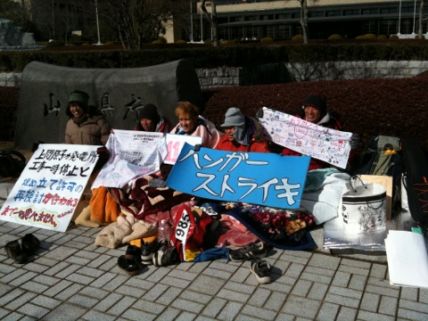|
|
Environment
Japanese Protesters End 240-Hour Hunger Strike Against Kaminoseki Nuclear Plant
Tuesday, February 1, 2011

Tokyo - (PanOrient News) Five young Japanese protesting against preparation work for the construction of a nuclear power plant have ended their hunger strike after 240 hours.
The five Japanese ended their hunger strike at 1 p.m. on Monday outside the Yamaguchi Prefecture government offices in Yamaguchi City. They were protesting against land-fill and sea reclamation work being carried out in preparation for the construction of a nuclear power plant on the coast of the environmentally sensitive Seto Inland Sea.
The strikers had to face adverse conditions, including snow, in Yamaguchi City.
A ceremony to mark the end of the strike was held outside the prefectural government offices and attended by over 40 people, including politicians and union members.
Social Democratic Party Member of Parliament Ryoichi Hattori joined the protesters in a gesture of support on Sunday, along with Prefectural Assembly Member Akemi Sasaki.
Supporters said the condition of the hunger strikers' was good, but their resistance to the cold had diminished.
"Now that we have finished our hunger strike, we will work to expand the opposition to new nuclear power plants and nuclear exports with the aim of bringing about a phase-out of nuclear energy," a statement by the strikers said.
They denounced the plan to build a nuclear power plant, which, they say, will endanger the eco-system. Nuclear power plants, they point out, produce the same radioactive material that was produced by the nuclear bombs dropped on the Japanese cities of Hiroshima and Nagasaki.
The statement added: “We believe that it is precisely because Japan knows the horror of nuclear weapons that it should abandon nuclear power, which produces radioactive waste that cannot be disposed of, leaks radiation into the environment and entails a high risk of nuclear accidents.”
The protesters claim the Japanese government and nuclear power companies conceal the negative effects of nuclear energy.
Naoya Okamoto, one of the hunger strikers, told PanOrient News that his group “doesn’t want to be part of a society that is built on the assumption that some people have to be victims, a society that, by prioritizing money over life, creates war, poverty and nuclear waste.”
The protesters want Japan to stop building nuclear power plants in Japan and exporting them to the Middle East and elsewhere.
Chugoku Electric Power Company plans to build two nuclear power plants on the Seto Inland Sea coast in Kaminoseki Town, Yamaguchi Prefecture.
Kaminoseki Town comprises a peninsula and several islands. It has a population of 3,600 people. The proposed construction site is on Nagashima Island which is connected by a bridge to the mainland. Iwaishima Island, which has a population of 500 people "who are almost all opposed to the nuclear power plant," is just 3.5 km across the sea from the construction site.
Preparation of the site is scheduled to take five years and reclamation work three years. The first plant is scheduled to commence operation in 2015, while the second plant is scheduled to commence operation in 2020.
Below is unofficial translation of a statement issued in Japanese language by the hunger strikers:
Nuclear power plants produce the same radioactive material that was produced by the nuclear bombs dropped on the Japanese cities of Hiroshima and Nagasaki.
We believe that it is precisely because Japan knows the horror of nuclear weapons that it should abandon nuclear power, which produces radioactive waste that cannot be disposed of, leaks radiation into the environment and entails a high risk of nuclear accidents.
Even if they operate without accidents, what nuclear power plants leave to future generations is nothing but polluted oceans, abandoned reactors and nuclear waste.
Young generations do not want such things. Things which threaten life in this way cannot be given the label "peaceful use".
We feel very sad that Japan is trying to export these things.
The people who have nuclear power plants foisted upon them will suffer as a result.
But in Japan the government and the nuclear power companies conceal the facts about nuclear energy, so we suspect that the average person has little interest in nuclear exports.
For this reason, having found out about these things, now that we have finished our hunger strike we will work to expand the opposition to new nuclear power plants and nuclear exports with the aim of bringing about a phase out of nuclear energy.
We want to expand the movement among young people like ourselves, who are particularly vulnerable to the effects of nuclear power.
Photo: Courtesy of Citizens' Nuclear Information Center
PanOrient News
© PanOrient News All Rights Reserved.
|
|

